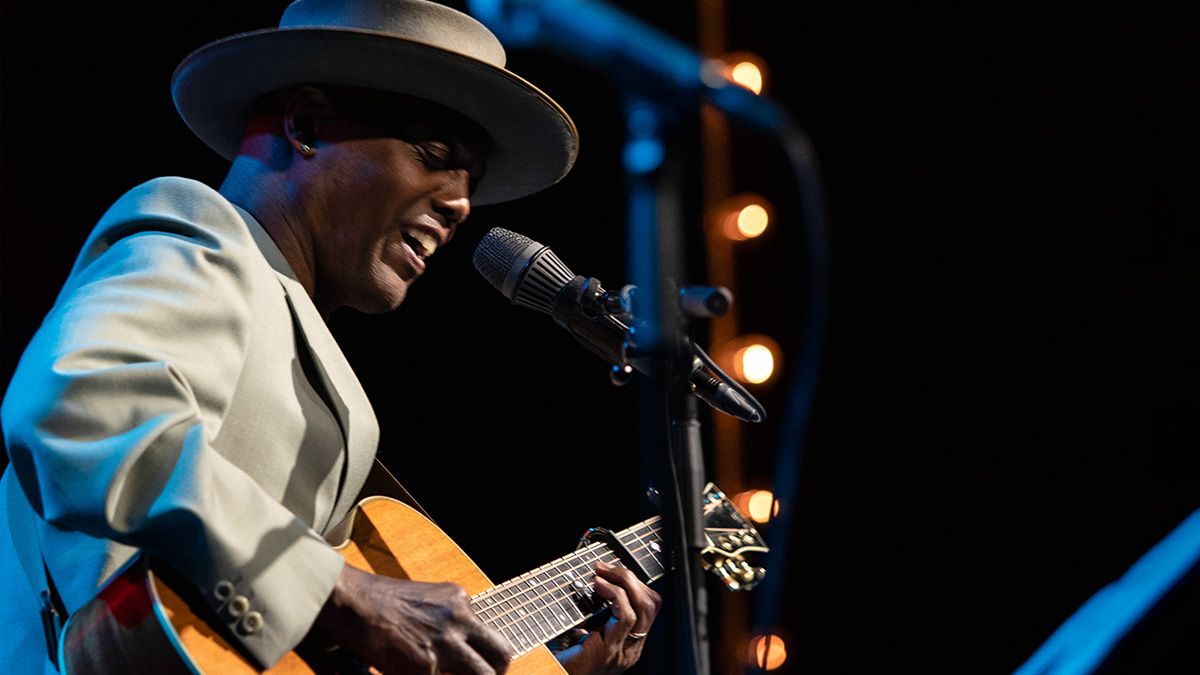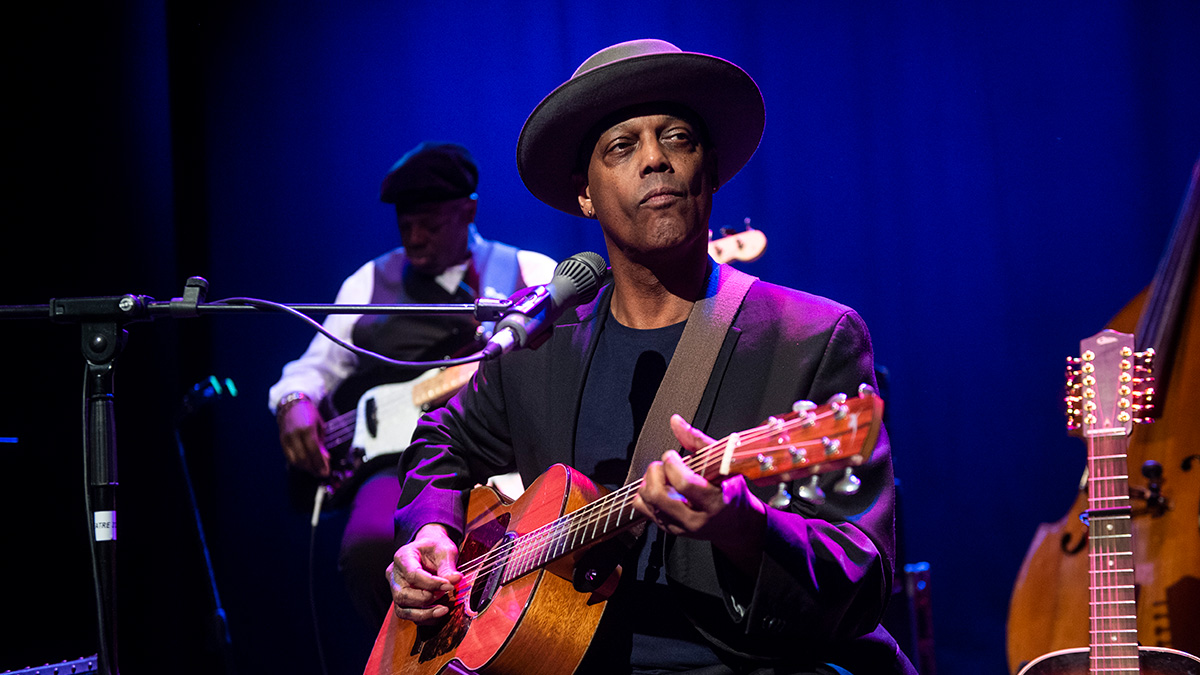
Eric Bibb has long been one of the most powerful, soulful storytellers in music. But with his new album, Ridin’, he may have made his masterwork.
Tracing the difficult paths African-Americans took to escape slavery in the 19th century, the musical canvas he paints on proves large enough to examine what it means to seek freedom, security and dignity in the present day, too. We join Eric to learn more about his captivating songcraft and the strangely beguiling voice of the six-string banjo.
The album initially took its inspiration from a painting, didn’t it?
“Yes, I don’t remember exactly where I first came across it… but Eastman Johnson was a painter who was successful and prolific during his career. But he painted this amazing image of an African American family escaping bondage, in the middle of the American Civil War.
“This was painted in 1862. So there’s a dad and a mom and a baby child on horseback. At dawn, it looks like, and they’re fleeing slavery – the painting is called ‘A Ride For Liberty’. I thought that title kind of just summed up where everybody, in one way or another, seems to still be: on some kind of ride for liberty, you know?
“Liberty from war, liberty from systemic racism, misogyny, whatever. I mean, there’s a lot of things that the human community needs to fix – and ‘A Ride For Liberty’ just seems to embrace all of that.”
There are some incredible stories woven into the songs. How did you pick them out from the huge backdrop of history?
“It wasn’t so planned or thought out in advance. I think once you decide that, there’s a kind of red line running through an album. Not all of the songs have to address specific concepts, but they have to somehow be related. I wrote the songs as I [always] write songs, more or less continually… Sometimes three songs will come and then nothing for a while.
“But very soon, I understood which of the songs I was writing would actually work on this album called Ridin’. So not all of the songs that I wrote in recent times are on that album, but quite a few were: the song The Ballad Of John Howard Griffin came very quickly as I remembered the book and read it again and thought, ‘Oh, this is going to work on this album, I gotta get this song together.’ This is a story that needs retelling. And the same with Tulsa Town.”
The amount of time we spend writing a song doesn’t always have a direct relationship to how good it is…
“Very well put. In fact, it’s probably almost an inverse kind of law, where the more time you spend on it, the less chance is that it’s going to really be one of those that stays with you for a very long time and resonates with fans. I find that the most effective songs, the ones that resonate most with the people who hear my music, are songs that come fairly quickly.
“And, in fact, fairly straight-ahead. I won’t say simple, but the core of the song is pretty solid, you know? Those are the songs that just seem to stick with people. I write and write and write, and maybe one in three songs will be a real song. The others will be what I call exercises in songwriting, or duds, you know?
“You’re struggling too hard to make something groovy and hip and it’s not really got enough juice to sustain a real song… but you write a finished song [of that kind], and you convince yourself for maybe 24 hours that it’s a good one. And then your wife tells you you’re fooling yourself [laughs].”
Tell us about the song 500 Miles – that’s a song with deep roots in the US folk scene.
“Well, I was around in the New York folk scene, because of my dad’s job [Eric’s father was folk singer Leon Bibb], in a major way. I was aware of who was out there and what they were recording, I’d often get acetate recordings of people before their record hit the market through my dad and his management. You know, I had a reel-to-reel tape of Leonard Cohen singing Suzanne long before it hit the airwaves… So I was privy to a lot of the currency, song-wise, that was floating around.
“Hedy West may have been the artist who kind of transformed that older song 900 Miles to a streamlined 500 Miles, which then was popularised, of course, by Peter, Paul and Mary, who made it a big hit, you know. I would say that many people had really fine versions of that song, including my dad.

“I’ll just tell you parenthetically, I remember my dad had recorded an album on the Liberty label called Encore. It was a live concert at a college or university and the rehearsal took place in Greenwich Village at the house of a well-known music producer.
“The bass player for that recording session, who played often with my dad, was Bill Lee – Spike Lee’s dad. I remember eyeballing the young Spike Lee across the room… we were [kids] just kind of checking each other out. But it was at that rehearsal – I’ll never forget it – that my dad’s guitarist and Bill Lee, his bass player, unveiled this arrangement they’d had for 500 Miles. And it really, really spoke to me.
“Years later, I decided to sing that song myself in my own version, which was, of course, inspired by my dad’s. I also thought it was working well with the Ridin’ theme because all these events, whether they are wars or massacres, that displace people… there are so many displaced people in the world by now. So being 500 miles from home is a feeling I think a lot of people in the world have at the moment.”
There are some incredible acoustic tones on the album, some of which are really percussive. What was that?
“Well, front and centre was a bunch of six-string banjos that I have that are old. One is French, from the ’30s, and one is American from the ’30s. And that six-string banjo is on at least four songs. I love it.
“It doesn’t work for everything, obviously – its sound is quite percussive and it’s clunky, and you need other things around it that have sustain. But it’s a very evocative sound that just somehow speaks to people. It’s got those African roots, it’s just a sound I really love.
“There were a bunch of acoustic guitars, some recorded naturally, some rerouted to amplifiers… We have all kinds of possibilities these days, and my producer is very creative. It’s been wonderful to just have as much time as we did, because of the pandemic, to really just tweak stuff until we were like, ‘Okay, we’ve got to stop now. This is it.’”
- Ridin' is out now on Repute Records.







